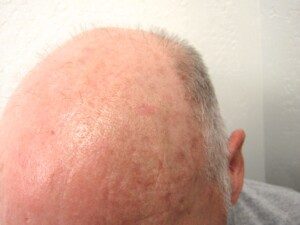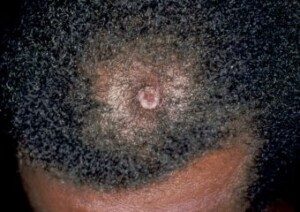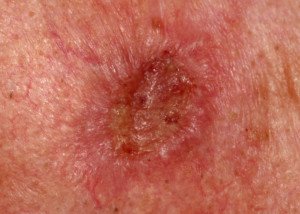Many black men proudly sport a bald head, which means a lot of sun exposure.
Can this mean a scalp cancer risk even though they have dark skin?
Men of all skin shades love their bald heads.
Whether the baldness is intentional from keeping a full head of hair continuously shaved, or whether much of the area is due to male pattern baldness, one’s head can get significant exposure to sunshine.
It’s reasonable to wonder if black men – who overall have a much lower risk of skin cancer when compared to very light skinned people – have to be concerned about possibly developing cancer on their scalp when they’re older – after decades of sun exposure and no sunscreen.
There are three types of skin cancer that can develop on a bald man’s scalp.
- Melanoma, the deadliest type, for which excess sun is a risk factor, though this cancer can also grow in areas hidden from the sun.
- Squamous cell carcinoma, which is much more related to sun exposure and more common than melanoma but less deadly, but it can still spread and be fatal.
- Basal cell carcinoma, also strongly related to sun exposure but very rarely life-threatening. And the world’s most common cancer overall.
What often happens is that a man’s bald scalp first develops precancerous lesions called actinic keratoses.
These are very slow growing and easily go unnoticed for many years, especially if there’s only a few patches.

Early actinic keratoses. Future FamDoc/CC BY-SA 4.0/creativecommons.org/licenses/by-sa/4.0/Wikimedia Commons
These lesions have a 10 percent chance of eventually, after many years, transforming into squamous cell carcinoma.
Most patients are white or light skinned. Though there is no large-scale data on what percentage of bald men, let alone bald men of color, eventually get squamous cell carcinoma or other skin cancer on their scalps, one thing has been established:
“All bald men are at greater risk of skin cancer on their scalps,” says Dina D. Strachan, MD, a board certified dermatologist, and founder/director of Aglow Dermatology in Manhattan, NY.
“Men with darker skin have a much lower risk.” Read that again: “much lower risk.”
This means that the risk is, indeed, present – but just a lot lower when compared to Caucasians.
Below is an image of a black man with squamous cell carcinoma on his scalp.

SCC on the scalp. Skin Cancer Foundation/Photo: Hugh Gloster, MD
The scalp is no exception to the risk of skin cancer, especially if there’s little to no hair, and the man rarely wears a hat or cap outdoors.
“Skin cancer is the most common malignancy in whites, representing approximately 30% of cancers,” says Dr. Strachan.
“Skin cancer represents about 1% of the cancer in blacks. The darker one’s skin, the lower is the risk of skin cancer.
“Increased sun exposure, chronic inflammation and chronic heat exposure increase the risk of skin cancer — as does the exposure to radiation.
“Look for rapidly growing lesions, sores that don’t heal, scaly lesions or lesions that change color.”
Check Your Bald Head Even if You Have Dark Skin
You need not be obsessive about this. But if you spend a lot of time outdoors, even on cloudy days (the sun’s radiation easily penetrates cloud cover), it certainly wouldn’t hurt to give your head a glimpse every month.
It also wouldn’t hurt to apply sunscreen on days you’ll be outside for extended periods.
Note: Having hair cover does not make any man, regardless of skin color, immune to cancerous lesions on his scalp.
 Dina D. Strachan, MD, is a board certified dermatologist, consultant and speaker in New York City. She is the founder and director of Aglow Dermatology, an independent medical and cosmetic dermatology practice in Manhattan. Follow her on Instagram and LinkedIn @drdinamd.
Dina D. Strachan, MD, is a board certified dermatologist, consultant and speaker in New York City. She is the founder and director of Aglow Dermatology, an independent medical and cosmetic dermatology practice in Manhattan. Follow her on Instagram and LinkedIn @drdinamd.
 Lorra Garrick has been covering medical, fitness and cybersecurity topics for many years, having written thousands of articles for print magazines and websites, including as a ghostwriter. She’s also a former ACE-certified personal trainer.
Lorra Garrick has been covering medical, fitness and cybersecurity topics for many years, having written thousands of articles for print magazines and websites, including as a ghostwriter. She’s also a former ACE-certified personal trainer.
.










































